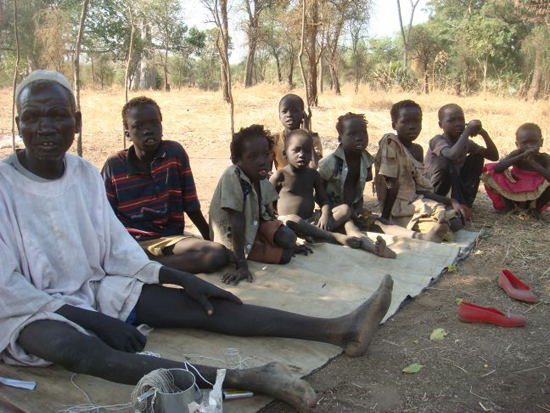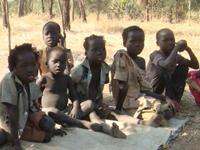This testimony from a 33-year-old refugee in the Doro camp in South Sudan describes the hardships he and his family have faced since arriving in the overcrowded camp.

South Sudan © Jean-Marc Jacobs
Refugees in Doro.
This 33-year-old man was interviewed in the Doro refugee camp in South Sudan on December 7, 2011. He was once a community health worker with an non-governmental organization (NGO) in Blue Nile State, Sudan, but has since spent 10 years in a refugee camp in Ethiopia during Sudan's civil war. He returned home in 2005, but has now been forced to register as a refugee once again.
“The journey here was very hard for us. It was so far. For me and my family it took about one week and a half to come here to Doro. Our small children could not walk far. My wife and our 11-year-old each carried the twins, who are one year old, on their backs. I was carrying our food and belongings. The others—who are aged nine, seven, and four—had to walk by themselves. The four-year-old can walk, but after a while he started crying.
When we were on the way, the children were very hungry. Some of them were sick with diarrhea. The sun was hot. We drank water that was not clean. But we managed to reach this camp.
Every day we started our journey early in the morning. We would walk for four hours at a time, then rest under a tree. If the children could not walk any more, we stayed there overnight. They would have a bit to eat and start playing. You could see their faces change suddenly when we told them it was time to start walking again. They knew they would be tired and they started crying. If they were okay to keep walking, we would go for another four hours. We were always looking for places where we could find water.
My children would ask me, 'Where are we going?' They wanted to go home. I told them we were running away from the war. We needed to get to a safe place.
Here there are a lot of problems facing us. We are just staying here because of security; we think we will be safe here.
This place is very cold at night. We light a fire because we have no sheets or blankets.
The only water is the hand pump for the local people from the area. There are many of us coming and we have to share the water together with the local people here.
Sometimes my wife goes to the water pump first thing in the morning and only comes back in the evening with water. It can take up to 12 hours to wait, from early in the morning to late at night. If she were to leave, she would lose her place in the line.
People here know MSF is giving health care to them by opening this clinic. If MSF hadn’t come, they could have suffered more. You hear people talking about how it is good that this clinic is helping them.
I just want to tell the world we need help, a lot of help, from them. We came to a place where we can be secure, but food security is now replacing the other security problem that we ran from. I will stay here until our home place has peace. But I worry that we may be here for a long time.”
Read about MSF’s emergency response to this refugee crisis here.




